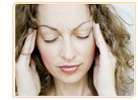Ginkgo Biloba Side Effects
 As well as providing a range of health benefits, herbal remedies such as Ginkgo biloba can produce undesirable effects. The side effects of Ginkgo biloba vary depending on the individual consumer, their dosage, and their medical history. As well as providing a range of health benefits, herbal remedies such as Ginkgo biloba can produce undesirable effects. The side effects of Ginkgo biloba vary depending on the individual consumer, their dosage, and their medical history.
It�s always advisable to discuss herbal and diet supplement intake with a doctor or pharmacist first. They are able to advise patients about possible drug interference as well as make recommendations about suitable brands and correct dosage.
Read on to find out more about how to take Ginkgo biloba correctly.
Ginkgo Biloba Warnings
Certain types of medication can interfere with Ginkgo biloba. Dangers occur when instructions are not complied with or dosage is ignored, so following the advice of a doctor and medication packaging is best. The type of medication that can interfere with Ginkgo includes:
. Blood-thinning medication such as warfarin (Coumadin), ticlopidine (Ticlid), clopidogrel, heparin, and aspirin - taken with Ginkgo this could result in excessive bleeding or hemorrhage.
. Medication for blood disorders - elements of the Ginkgo leaf can affect blood clotting.
. A number of herbal remedies, including devil�s claw, ginger, horse chestnut, red clover, and danshen should not be taken at the same time as Ginkgo because this can increase the risk of bleeding.
. Anticoagulants such as ibuprofen, aspirin, vitamin E, and warfarin. However, some studies show that Ginkgo has little or no effect on the anticoagulant properties.
. Anti-platelet agents.
. Drugs processed by an enzyme called cyp3A4.
It�s also possible that Ginkgo could trigger a seizure, so people with epilepsy or a history of seizures should avoid taking Ginkgo biloba. Bad reactions, including seizures, although rare, have been reported in people using the Ginkgo leaf or seed.
Fresh Ginkgo seeds should not be consumed. Roasted seeds can be eaten but may cause side effects such as diarrhea, nausea, vomiting, indigestion, or allergic skin reactions. Toxins in the seeds may result in seizures or loss of consciousness and taking large amounts of seeds over time can be fatal. Ginkgo leaf and leaf extracts seem to contain a small amount of toxins compared to the uncooked seeds.
 People with diabetes should only use Ginkgo biloba after consulting a physician because Ginkgo leaf extract can affect blood sugar levels. People with diabetes should only use Ginkgo biloba after consulting a physician because Ginkgo leaf extract can affect blood sugar levels.
It is also possible to experience an allergic reaction to Ginkgo biloba, so if there is a history of allergies to foods, dyes, or preservatives it�s best to speak to a doctor before taking Ginkgo.
Furthermore, people who have scheduled surgery and dental procedures should discuss Ginkgo usage with a doctor prior to use, as should pregnant women.
Gingko biloba can be used to relieve some menopause symptoms but it can also cause undesirable effects. Keep reading to find out more the side effects of Ginkgo biloba.
Side effects
Seek medical help if any of these symptoms occur after taking Ginkgo:
 . Digestive problems (Stomach upset or Diarrhea) . Digestive problems (Stomach upset or Diarrhea)
. Headache
. Fainting or Muscle weakness
. Unusual bleeding or bruising
. Heart palpitations
. Restlessness
. Nausea or Vomiting
 It�s possible to experience an allergic reaction to Ginkgo and symptoms include a rash, itching, swelling, dizziness, and breathing difficulties. If such symptoms do occur then discontinue use and speak to a doctor or pharmacist. It�s possible to experience an allergic reaction to Ginkgo and symptoms include a rash, itching, swelling, dizziness, and breathing difficulties. If such symptoms do occur then discontinue use and speak to a doctor or pharmacist.
Ginkgo side effects may be caused by impurities of variations between brands. Also, the strength of the product may increase the risk of side effects.
Nowadays, Ginkgo is prescribed in France and Germany to treat circulation disorders and ailments such as absent-mindedness and confusion. Although Ginkgo has been the subject of various studies in Europe, most of these have been small, poorly designed, or inconsistent. Therefore, many health professionals claim that further research is needed into the side effects of Ginkgo biloba.
Ginkgo can relieve some symptoms of menopause. However, it also has some hormonal side effects. Read on to learn more about the hormonal side effects of Ginkgo biloba.
Ginkgo Substitutes
Adverse side effects from hormone replacement therapy (HRT), such as irregular bleeding and increased risk of breast cancer, are prompting many women to choose herbal remedies instead. Research shows that the standardized Ginkgo extract has estrogenic activity and may be an appropriate substitute for HRT.
Because Ginkgo contains phytoestrogens, plant chemicals which act in a similar way to estrogen, it raises hormone levels by replacing human hormones with plant substitutes. Many scientists question the safety of Ginkgo biloba and claim that women taking Ginkgo may be prone to developing breast cancer and other conditions because it contains phytoestrogens.
Despite its side effects, Ginkgo biloba is often used to help menopausal women. Read the next section to find out more about Ginkgo and menopause.
Conclusion about Ginkgo biloba
Ginkgo biloba is an herbal remedy that can alleviate some menopausal symptoms. However, there are side effects of Ginkgo biloba and as a phytoestrogenic herb it is often criticized for replacing human hormones with plant substitutes. Health professionals believe that non-estrogenic herbs are safer because they encourage the body�s own production of hormones and do not introduce external hormones into the body. Also, they do not have the side effects of Ginkgo biloba and other phytoestrogenic herbs.
Which herb should women try? Today women are looking for relief from their menopause symptoms with herbs. Phytoestrogenic herbs and non-estrogenic herbs are good in relieving menopause symptoms, but recent studies show that non-estrogenic herbs have no side effects because they help the body to produce its own hormones instead of introducing hormones like the phytoestrogenic ones. Learn more about non-estrogenic herbs for menopause.
| 

